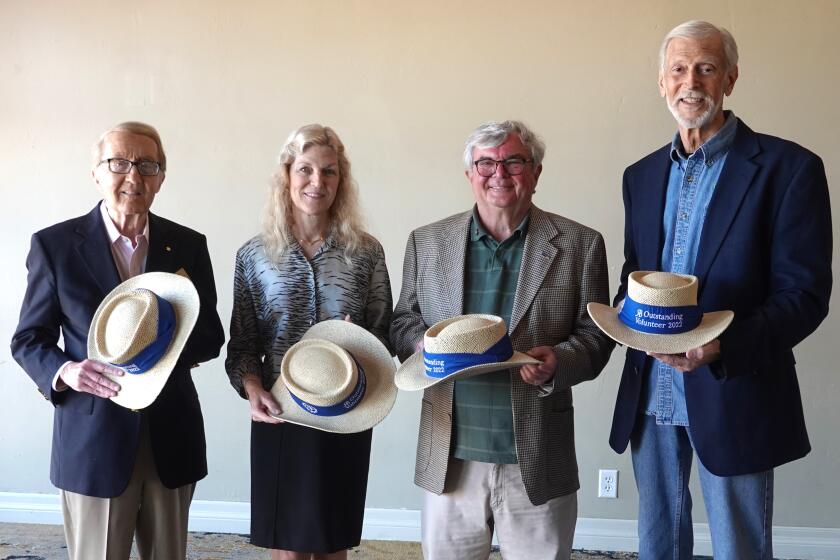San Diego city attorney critical of strong mayor system
With about 18 months left as San Diego City Attorney, Jan Goldsmith said he felt free to express his views on what works — or doesn’t — in San Diego.
Goldsmith — who has held the city’s top legal post for more than six years, was Poway’s first elected mayor, a three-term state assemblyman, superior court judge and successful attorney in private practice — spoke during the Conservative Order for Good Government’s luncheon on Tuesday in Rancho Bernardo.
“The City of San Diego is much too complicated,” Goldsmith said, contrasting it to the much smaller City of Poway that he said “works.”
“Ordinary people need to know where to go to express their views, but (in San Diego) there are too many organizations that are ancillary. It’s not really local government.”
He said Civic San Diego — the city-owned nonprofit tasked to be the entrepreneurial development partner for the city’s urban neighborhoods — is one example. “(It) does great work downtown, but do you know who in the office to call? It’s not local governance.”
Goldsmith said too many people and entities are making decisions for the city, which is a problem. In contrast, he said those in Poway felt a love for their community in their hearts and understood what was going on at their City Hall more.
“Second, the strong mayor form of government doesn’t work,” he said.
San Diego voters approved the city moving from a city manager system to strong mayor in November 2004. It went into effect in January 2006, making the mayor the city’s chief executive officer and City Council San Diego’s legislative body to provide checks and balances to the mayor’s new authority.
Having experience with both — Poway uses the city manager form — Goldsmith said he prefers city manager because strong mayor means the city has a chief operating officer who gets direction from the mayor “behind closed doors.”
While Goldsmith said “nothing nefarious” has happened, the system impedes government transparency.
“This is the process we set up with the idea it would be more efficient, but it is more political ... and not transparent,” he said. “(Disgraced former mayor Bob) Filner could not have created the problems he did if there was a city manager. ... It could happen again.”
As for what does work in San Diego, Goldsmith cited the city’s pension situation, which has been reduced. “It is not the dark cloud over our future.”
He said several pension reforms were already taking place before he took office in late 2008, voters approved more reforms since then and there have been internal changes as well, all of which have placed San Diego in a better financial situation than many other cities across the nation that have looming pension problems.
Goldsmith said the city is paying $250 million per year to fix its pension situation and within 15 years the annual payments will drop to $60 million.
“It’s painful now (but we’ve) got a bright future and not the same problem major cities across the country (face),” Goldsmith said. “This one we’ve dealt with. ... Now we have a solid future.”
As for other issues:
• Goldsmith explained how he and the City Council worked together to get rid of Filner after his sexual harassment actions came to light, calling it “their legal obligation.” He said Filner has a mental health problem, which is better now due to medication and therapy, and had Filner been receiving treatment earlier, he would likely not have needed to be removed from office. His mental health problem accounted for the way he treated women and his abusive demeanor to many that he exhibited immediately upon entering office, Goldsmith said.
He added that their so-called “feud” is in the past and Filner has apologized for his behavior to Goldsmith. The city attorney said the media should have done more to bring his behavior to light prior to the election.
• Regarding the Chargers, Goldsmith said many costly bad decisions have been made over the years, especially from 2001 to 2006. The result is that the city has paid the Chargers more than $3 million to play here instead of collecting almost $23 million in rent from the team for its use of Qualcomm Stadium from 2006 to 2013 due to rent credits and an Americans with Disabilities Act settlement reimbursement.
“We pay the Chargers to be our tenant. How did we do that?” he asked.
Going forward, he said the city has hired experts in the football stadium negotiation process so “we do not let them take our pockets this time. ... We (will) go into this with our eyes open.”
Goldsmith said he believes the Spanos family wants the team to stay in San Diego, but understands their situation since their financial future depends on what happens if one or two teams move to Los Angeles. He also said the issue needs to go before voters, but likely cannot happen before year’s end without a special election.
“The key thing is that right now the Chargers and city are talking,” he said. “That was not the case before.”
• The police department is on the right track to discovering its few bad officers, whom Goldsmith said are a very small number compared to all the good officers who are sick over how a few have tarnished the department.
“Their credibility far, far, far outweighs the few we call cowboys,” he said. “But those few do carry guns and have power.”
He praised Chief Shelley Zimmerman for bringing back an undercover sting program to identify officers who break the law, something he said her predecessor, Chief William Lansdowne, discontinued. In addition, Goldsmith said police body cameras are a good thing because “cameras don’t lie.” He said they keep police officers honest and lead to civilians behaving better when interacting with police.





